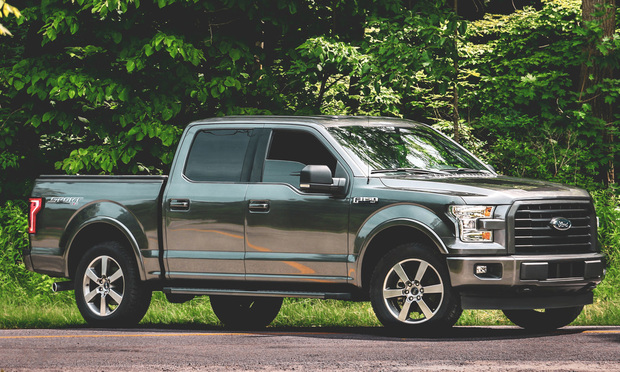Design Patent Argument for Replacement Auto Parts Crashes at Federal Circuit
Ford wins a Federal Circuit ruling that protects its designs on hoods and headlamps. That means consumers might have to buy any replacements from Ford, or use parts that don't match.
July 23, 2019 at 07:12 PM
4 minute read
 Ford F150
Ford F150
Auto makers may be gnashing their teeth about paying license fees for standard-essential patents that connect cars to the internet. But now it looks as if they'll be able to recoup some of those IP costs by protecting replacement auto parts with design patents.
The Federal Circuit on Tuesday turned away a replacement part trade group's bid to limit the reach of design patents on hoods, headlamps and other parts that serve both a functional and ornamental purpose.
The upshot of Automotive Body Parts Association v. Ford Global Technologies is that if consumers need replacement hoods or headlamps that look exactly like the one on an F-150, they would either have to buy from Ford or from parts makers who have paid a license. The decision was issued under seal earlier this month and made public Tuesday.
ABPA had argued that design considerations for replacement parts are primarily functional in nature and therefore not subject to design patents. “The only role that design plays in an owner's decision to buy such a part is that the design must match the design of the original part to return the vehicle back to its original condition and appearance,” ABPA's attorney, Robert Oake Jr. of Oake Law Office had argued in briefs to the court.
Alternatively, he argued that the original sale of the F-150 should exhaust Ford's design patent rights.
The Federal Circuit disagreed on both counts Wednesday. “We hold that, even in this context of a consumer preference for a particular design to match other parts of a whole, the aesthetic appeal of a design to consumers is inadequate to render that design functional,” Judge Kara Stoll of the U.S. Court of Appeals for the Federal Circuit wrote for a unanimous panel.
Judges Alvin Schall and Todd Hughes concurred.
ABPA had tried to analogize to a case in which the Federal Circuit held that a design patent on a key blade was unpatentable. “That was done in an effort to control the market for replacement keys, just like Ford is trying to control the market for repair parts,” Oake told the court at a January hearing.
“But that's the consequence of getting a patent on something,” Judge Todd Hughes had replied. “If it's patented, other people can't make or manufacture or sell it, absent a license.”
In Tuesday's opinion, Stoll wrote that the key case turned on the fact that no alternatively designed blade would mechanically operate the lock—“not that the blade and lock were aesthetically compatible.” Plenty of alternative headlamp and hood designs will fit Ford's trucks, even if they don't look exactly like the original.
As for exhaustion, that covers only the parts sold with the original truck, not replacements. ABPA had asked the Federal Circuit to modify that rule for design patents, but Stoll declined. “Our precedents do not differentiate transactions involving embodiments of patented designs from those involving patented processes or methods,” she noted.
Hogan Lovells partner Jessica Ellsworth had the winning argument for Ford Global Technologies. At the January hearing she had analogized to a Federal Circuit case involving design patents on surgical instruments. “The fact that doctors may prefer a certain arrangement of the buttons and the setup of that surgical instrument doesn't make it functional if in fact other designs serve the exact same useful purpose,” she told the court. “And that, I think, puts an end to what the ABPA is arguing here.”
This content has been archived. It is available through our partners, LexisNexis® and Bloomberg Law.
To view this content, please continue to their sites.
Not a Lexis Subscriber?
Subscribe Now
Not a Bloomberg Law Subscriber?
Subscribe Now
NOT FOR REPRINT
© 2025 ALM Global, LLC, All Rights Reserved. Request academic re-use from www.copyright.com. All other uses, submit a request to [email protected]. For more information visit Asset & Logo Licensing.
You Might Like
View All
DOT Moves to Roll Back Emissions Rules, Eliminate DEI Programs

Recent FTC Cases Against Auto Dealers Suggest Regulators Are Keeping Foot on Accelerator
6 minute read
'New Circumstances': Winston & Strawn Seek Expedited Relief in NASCAR Antitrust Lawsuit
3 minute read
Cars Reach Record Fuel Economy but Largely Fail to Meet Biden's EPA Standard, Agency Says
Trending Stories
- 1Lawyers' Reenactment Footage Leads to $1.5M Settlement
- 2People in the News—Feb. 4, 2025—McGuireWoods, Barley Snyder
- 3Eighth Circuit Determines No Standing for Website User Concerned With Privacy Who Challenged Session-Replay Technology
- 4Superior Court Re-examines Death of a Party Pending a Divorce Action
- 5Chicago Law Requiring Women, Minority Ownership Stake in Casinos Is Unconstitutional, New Suit Claims
Who Got The Work
J. Brugh Lower of Gibbons has entered an appearance for industrial equipment supplier Devco Corporation in a pending trademark infringement lawsuit. The suit, accusing the defendant of selling knock-off Graco products, was filed Dec. 18 in New Jersey District Court by Rivkin Radler on behalf of Graco Inc. and Graco Minnesota. The case, assigned to U.S. District Judge Zahid N. Quraishi, is 3:24-cv-11294, Graco Inc. et al v. Devco Corporation.
Who Got The Work
Rebecca Maller-Stein and Kent A. Yalowitz of Arnold & Porter Kaye Scholer have entered their appearances for Hanaco Venture Capital and its executives, Lior Prosor and David Frankel, in a pending securities lawsuit. The action, filed on Dec. 24 in New York Southern District Court by Zell, Aron & Co. on behalf of Goldeneye Advisors, accuses the defendants of negligently and fraudulently managing the plaintiff's $1 million investment. The case, assigned to U.S. District Judge Vernon S. Broderick, is 1:24-cv-09918, Goldeneye Advisors, LLC v. Hanaco Venture Capital, Ltd. et al.
Who Got The Work
Attorneys from A&O Shearman has stepped in as defense counsel for Toronto-Dominion Bank and other defendants in a pending securities class action. The suit, filed Dec. 11 in New York Southern District Court by Bleichmar Fonti & Auld, accuses the defendants of concealing the bank's 'pervasive' deficiencies in regards to its compliance with the Bank Secrecy Act and the quality of its anti-money laundering controls. The case, assigned to U.S. District Judge Arun Subramanian, is 1:24-cv-09445, Gonzalez v. The Toronto-Dominion Bank et al.
Who Got The Work
Crown Castle International, a Pennsylvania company providing shared communications infrastructure, has turned to Luke D. Wolf of Gordon Rees Scully Mansukhani to fend off a pending breach-of-contract lawsuit. The court action, filed Nov. 25 in Michigan Eastern District Court by Hooper Hathaway PC on behalf of The Town Residences LLC, accuses Crown Castle of failing to transfer approximately $30,000 in utility payments from T-Mobile in breach of a roof-top lease and assignment agreement. The case, assigned to U.S. District Judge Susan K. Declercq, is 2:24-cv-13131, The Town Residences LLC v. T-Mobile US, Inc. et al.
Who Got The Work
Wilfred P. Coronato and Daniel M. Schwartz of McCarter & English have stepped in as defense counsel to Electrolux Home Products Inc. in a pending product liability lawsuit. The court action, filed Nov. 26 in New York Eastern District Court by Poulos Lopiccolo PC and Nagel Rice LLP on behalf of David Stern, alleges that the defendant's refrigerators’ drawers and shelving repeatedly break and fall apart within months after purchase. The case, assigned to U.S. District Judge Joan M. Azrack, is 2:24-cv-08204, Stern v. Electrolux Home Products, Inc.
Featured Firms
Law Offices of Gary Martin Hays & Associates, P.C.
(470) 294-1674
Law Offices of Mark E. Salomone
(857) 444-6468
Smith & Hassler
(713) 739-1250








